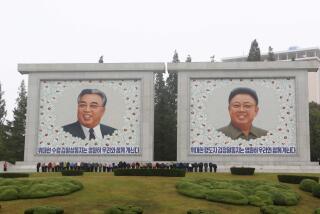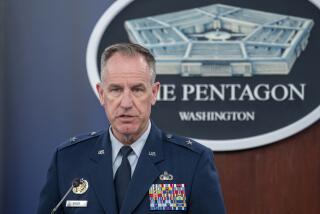A Bigger Peril: Dirty Bombs
- Share via
During the Cold War, the United States, under the Atoms for Peace program, and the Soviet Union actively exported nuclear materials abroad to friendly countries. The justification was that they were helping to promote the peaceful use of nuclear energy. Now the U.S. and Russia are reviving efforts to retrieve uranium before it ends up in a terrorist dirty bomb detonated in a major city.
On Thursday, in a deal that followed a welter of new terror warnings from the Justice Department, Energy Secretary Spencer Abraham signed a $450-million agreement with Russia to retrieve nuclear materials.
Information about contributions to the global nuclear black market by top Pakistani scientist Abdul Qadeer Khan has prompted the administration to revive its lagging nonproliferation efforts. In a Feb. 11 speech, President Bush warned that “terrorists and terror states are in a race for weapons of mass murder, a race they must lose.”
Yet, as a new Harvard University study obtained by the Washington Post reports, not enough is being done against such weapons. Less fissile material was put in safekeeping in the two years after Sept. 11 than in the two years preceding it. More than 40 countries could supply materials for an atomic weapon. The U.S. has spent billions since 1992 to secure nuclear materials, but bureaucratic wrangling has stalled many programs inside Russia. According to the General Accounting Office, even rudimentary safety measures to deter the theft of dangerous materials are lacking at many Russian nuclear labs. What’s more, the Energy Department’s own auditors warned in February that substantial caches of uranium produced here were “out of U.S. control.”
Abraham’s initiative states that the U.S. will retrieve radiological material it has sent abroad and earmarks $100 million to aid Russian efforts. According to Atomic Energy Minister Alexander Rumyantsev, Moscow will remove uranium from 20 Soviet and Russian-built reactors in 17 countries. Russia also promises not to complete Iran’s Bushehr nuclear power plant without a guarantee that spent fuel will be sent to Moscow.
Though Abraham’s move is a welcome one, the Bush administration continues to waste far larger sums on a missile defense system intended to defend the country against nuclear missile attacks from rogue states or terrorists. For 2005, the administration’s funding request is more than $10 billion, about 22 times the cost of the Energy Department effort. Yet most experts agree that groups such as Al Qaeda are far more likely to produce dirty bombs than nuclear missiles. It makes more sense to invest in preventing nuclear materials from falling into the hands of terrorists than to pour billions into a system that has succeeded only in what amounts to rigged testing.
The Abraham initiative deserves credit as a cost-effective program against an immediate danger. Missile defense, on the other hand, is most effective as a profit center for the defense industry.










